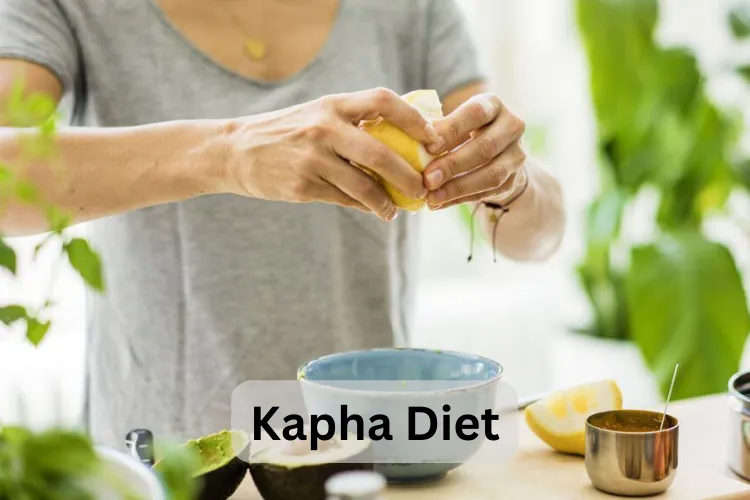Kapha Dosha Diet
Kapha is one of the life forces of Ayurveda, which has earth and water associated as the elements. It is required to lubricate the joints, protect the cells and tissues against external forces.
Consequently, Kapha is also responsible for solidity and maintaining the body fluids within the body.
It is a dosha that holistically governs the structure of the body and also holds all the tissues and cells within the body, forming fat, bones, and muscles.

Table of Content
Individuals with Kapha dosha have good stamina and good digestion. They are active and have a strong build unless they have an imbalance.
Incase of Kapha imbalance, the body may face a lot of problems, including weight gain, fatigue, allergies, and more severe problems.
The constitution of our body is decided on the three fundamental life forces.
The diet, medicine, and treatment are all based on these fundamentals.
People with Kapha dosha need to constantly work on their metabolism. They should avoid raw foods and focus on cooked and easy-to-digest food.
Pungent and bitter flavors are pacifying flavors for Kapha.
Kapha dosha individuals can skip breakfast as they do not have hunger pangs in the morning. However, they need to spur their digestion, which they can by drinking warm water, lemon, and honey to aid digestion and preparing it for the start of the day.
Kapha individuals need to follow the rule of thumb to not eat more than three meals per day. Also, the heaviest meal that should be consumed should be during the afternoon as that is when the metabolism is at its peak.
The golden rule for Kapha types when eating is to consume less than you think. Maintaining a low appetite and snacking between meals should be avoided, save from the odd exception.
Kapha dosha types do not need to drink a lot of water. However, they should try to drink warm drinks and only use honey as a sweetener if required.
Kapha Diet Chart
Food is an important aspect in Ayurveda to balance the doshas. Also, each dosha has a specific and customized diet that can be followed.
Let’s briefly look at the Kapha Diet Chart.
Nuts are rich and fatty; hence, they should be avoided.
- Sugar or any sweet should be avoided as it increases the Kapha in the body. Honey can be consumed as it is excellent to balance Kapha.
- Herbs like turmeric, ginger decrease the Kapha in the body. Try to consume low-fat milk by adding turmeric or ginger to the hot milk.
- Sour and very sweet fruits should be completely avoided. The fruits such as dates, coconuts, melons, oranges should be avoided.
- Try to cut down on salt drastically.
Ayurvedic Health Tips
Kapha-dominated people should always try to be physically active and try to do more cardio-based workouts, which involves rigorous physical exercise.
They should not get into a comfort zone at all as they get attached to people, places, things. Hence, they should keep on experimenting in all areas of life.
e.g., They should follow 3 different types of exercise within a week. Change their weekly schedule or monthly schedule.
It would be better if they look out for an exciting situation rather than an afternoon nap.
Purification of Kapha Dosha
Kapha individuals can relax by getting herbal oil massages and Panchakarma therapy. Panchakarma therapy focuses on purifying and removing impurities out of the body. It is also one of the basic processes of purification, which is performed to maintain the equilibrium of the body. It is all about recovery and rejuvenation at the same time.
The liquid diet should be done at least once a week to give rest to the slow digestion. Kapha diets should include more liquids such as soups, herbal tea, as they tend to revive digestion.
Along with herbal teas, including herbs such as turmeric, Triphala, and ginger in your diet.
Honey also helps remove Kapha from the body. Hence, include 1 tsp of Honey every day.
Use olive oil, almond oil, or ghee for cooking.
Nuts are very high in fat; hence, it is advised not to consume nuts. Pumpkin and sunflowers can be consumed in moderation.
Ayurvedic Recipes For Kapha- Herbal Tea.
Take 1-2 cups of water and bring it to a boil
Add ¼ inch of ginger and let it simmer
Pour it in a cup and add herbal tea bags
You can even increase the quantity and sip on it throughout the day.
Kapha Imbalance Diet
A diet consumed daily by Kapha individuals should be as per your particular dosha. The food that is attributed as very healthy may not suit your dosha, or the healthy diet that has shown wonders on a pitta diet may not suit the Kapha diet.
Hence, you see that some have a sweet tooth and consume a lot of sweets but do not put on weight. At the same time, one single cookie can ruin the efforts of a 10-day diet. This is because sweet favors or pacifies the pitta diet and not the Kapha diet.
Though there are three Dosha qualities, an individual has one dosha dominant or the combination of two. However, some have a combination of all three doshas forming a Tridosha.
Balancing Kapha with Lifestyle
Exercise is a prerequisite for Kapha dosha individuals more than any other doshas, as Kapha bodies can tend to become overweight.
Make a clutter-free environment around you. Keep the things which you need and are of purpose. Kaphas tend to get attached to things resulting in piles and clutter around them.
Drink herbal tea, take oil massages to boost yourself, and always remain active.
Give preference to cardio in terms of exercise. If you opt for yoga, try to indulge in difficult poses.
Keep the company and environment around you lively and vibrant. Try essential and ayurvedic oil for that instant spark.
Be in touch with your senses, energy, and emotions. Do not delve into negative thoughts and emotions.
Keep your diet light which will make you feel and give you energy, rather than having heavy meals that make your body heavy and make you feel lethargic.
People with Kapha balance are the happiest and the most joyous people. Hence, take care of all factors to maintain your Kapha.
Kapha Dosha Food List
Below are the fruits that should be consumed to reduce Kapha Dosha
Apple, apricots, berries, pears, cherries, mangos, dried fruit, peaches, pomegranates, cranberries, and raisins are recommended. Dried figs and plums are good, but other dried fruits should be avoided if possible.
Vegetables for Kapha Dosha
Aubergines, cabbage, cauliflower, lettuce, garlic, broccoli, chicory, peas, fennel, onions, carrots, celery, cabbage, peppers, peas, mushrooms, radishes, sprouts, beetroot, asparagus, bean sprouts, spinach.
Grains for Kapha Dosha
Barley, corn, millet, quinoa, oats, buckwheat.
Diary for Kapha Dosha
Reduce consumption of milk, prefer soy milk, and avoid cheese completely.
Sweetener for Kapha Dosha
Honey and organic Jaggery only.
Herbs for Kapha Dosha
Mostly all the spices, including garlic, ginger, nutmeg, turmeric, cloves, cardamom, coriander, cinnamon, fenugreek, and mint.
Conclusion
An ideal Kapha diet should be food that keeps you energetic and full of life. The mantra for Kapha people should be to eat in moderation and during a set time itself. Breakfast should be the heaviest, with a hearty lunch and a light dinner.
Keep a gap of a minimum of 3 hours in between every meal. Exercise is a must, not only for fitness but also as a mood booster.
Kaphas usually have a slow metabolism, and they need to stimulate it frequently. Hence, eat cooked and warm meals instead of raw food as they can be digested easily, which helps to reduce the Kapha.
Kapha is one of the doshas that, when balanced, does wonders!
















